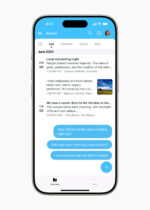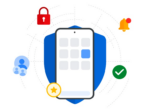Winds of change in the mobile development space are blowing as furiously as Hurricane Irene, which took down electricity at SD Times’ Long Island-based offices. (But thanks to mobile phones and devices, we were still able to communicate!)
Look back at the incredible changes in August 2011. Google will be acquiring Motorola Mobility, which is being seen mainly as a patent play. That aside, the deal gives Google its own hardware platform to better compete with the capabilities of the iPhone and sets a higher bar for Motorola’s many competitors.
Meanwhile, Apple—the resignation of ailing Steve Jobs aside—has hinted about exciting new capabilities in iOS 5. The faithful hope that the updated operating system will close the gap with Android for developers, who prefer Google’s open approach to Apple’s walled garden.
Hewlett-Packard—continued executive bungling aside—announced it was discontinuing its efforts in the mobile and tablet space, effectively bringing the webOS system it acquired with Palm to end-of-life. Given the high profile of HP’s investment in webOS and in the TouchPad launch, this represents either incredible vision or astonishing ineptitude.
Let’s not forget Microsoft—lateness to the game aside—which was expected to have some important announcements surrounding Windows Phone 7 at its Build 2011 conference. We’ll have more on that in the October issue, as well as on sdtimes.com.
So what do all these machinations mean for you, Mr./Ms. Software Development Manager?
If you’re committed to only one of these mobile platforms, none of this matters. (Well, it does if you were foolish enough to bet on HP and webOS.) But, if you are committed to only one of these platforms, you are missing the big picture.
Keep your eyes on the cross-platform application development platforms that allow you to “write once, run anywhere” in the mobile world. There are some 20 of them, each supporting a multitude of programming languages and an emulator, and they can use the native distribution format of each mobile phone system.
Industry analysts and pundits agree that developers should not be writing platform-specific applications, since no one device “owns” the market. Broad reach is critical for enterprise applications. Don’t deny 30% of your customer base the opportunity to interact via the device of their choice simply because developers wanted a “native” experience on one platform. Cross-platform is the way to go as we sail these winds of change.
Forget patents: Copyright is enough
Software patents have outlived their usefulness. Not that they were terribly useful to begin with, but at least in the 1990s there were some very small fish protecting their livelihoods from giant usurpers via patent protections. Today, however, almost no one’s making money from software patents; instead, they’re using them as sandbags.
Who benefits from software patents? Giant corporations and law firms. Patents don’t protect garage-based inventors selling huge dreams to big companies. Instead, just having a software product is enough to attract the very sharks that developers and IT geeks have tried to avoid for years. Software development is an art and a science, not a nuclear battleground for the strategic movement of assets between giant international corporations.
Software patents have to go. They no longer have a place in our society. Copyright law is well laid out, sensible and offers plenty of protection for software developers. After all, the real desire here is to protect the authors of the code from having their work stolen. The problem is, software is now so corporate and littered with lawyers that it’s considered the norm for a useless, dead-in-the-water company to be snatched up for billions just for its patents. Keep an eye on HP, because this could mean that the old Palm assets are now worth upwards of US$10 billion, thanks to a portfolio of patents relating to personal digital assistants.
Can you imagine if Hollywood had this problem? What if plots and ideas in movies could be patented? While we’d have less sequels; we’d also have creative people in virtual handcuffs, always worrying about what they can and cannot write about. Plus, thanks to Hollywood’s powerful lobbying work, Congress would have remedied the issue in weeks.
Sorry, software patent advocates. It’s time for this madness to end. At the end of the day, software is just text and numbers arranged in a specific order. It’s the perfect battleground for copyright litigation, but when it comes to patents, it just makes everyone less innovative. You can’t write proper code when there’s a lawyer reading over your shoulder, reminding you that the linked list is patented.
Ending the Founder Era
Tens of thousands of words have been written about Steve Jobs’ recent resignation as CEO of Apple, his replacement by Tim Cook, and speculation about Jobs’ health and role as Apple’s chairman.
We join Jobs’ customers, competitors, partners and family in wishing him good health and long life, and also thanks for his many years of industry leadership. Call it the reality distortion field’s last flicker, but Steve Jobs is truly unique.
With the end of Jobs’ day-to-day involvement in Apple’s affairs, it’s worth noting that few of our industry’s founders remain at the helm of their companies. Bill Gates has moved on from Microsoft, and Scott McNealy’s company is part of Oracle. IBM, Intel and SAP’s leaders aren’t their founders; the less said about HP’s current leadership, the better.
For founders still running giant companies, we can look at Larry Ellison over at Oracle, and Larry Page and Sergey Brin at Google, as well as Jeff Bezos at Amazon and Marc Benioff at Salesforce. There are a few others, to be sure. But there will never be another Steve Jobs.





